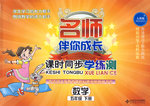题目内容
You’d better make the plants shorter, ______ they will interrupt the views from the house.
A. but B. and C. so D. or
练习册系列答案
 名师伴你成长课时同步学练测系列答案
名师伴你成长课时同步学练测系列答案
相关题目
题目内容
You’d better make the plants shorter, ______ they will interrupt the views from the house.
A. but B. and C. so D. or
 名师伴你成长课时同步学练测系列答案
名师伴你成长课时同步学练测系列答案